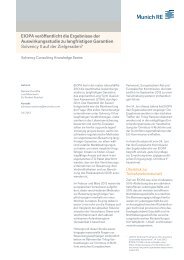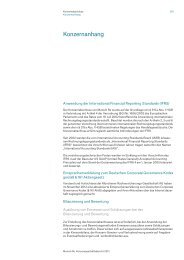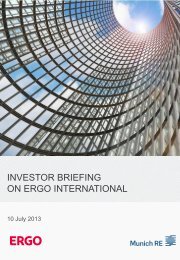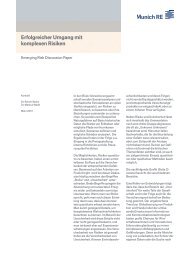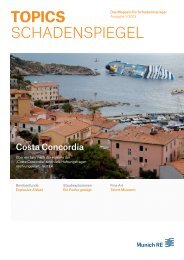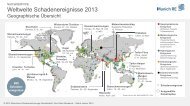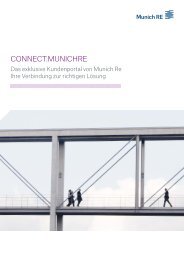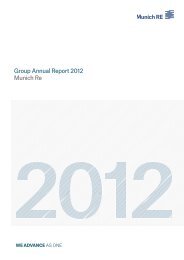Munich Re Group Annual Report 2006 (PDF, 1.8
Munich Re Group Annual Report 2006 (PDF, 1.8
Munich Re Group Annual Report 2006 (PDF, 1.8
Create successful ePaper yourself
Turn your PDF publications into a flip-book with our unique Google optimized e-Paper software.
<strong>Munich</strong> <strong>Re</strong> <strong>Group</strong> <strong>Annual</strong> <strong>Re</strong>port <strong>2006</strong> Management report_Risk report<br />
contained in such policies. The fact is that the damage<br />
along the coast was caused mainly by the storm surge<br />
accompanying Katrina rather than as a direct result of<br />
the wind. Despite the good arguments of the insurers<br />
(the exclusion of flood damage in private buildings<br />
insurance policies has been established practice for<br />
years and has been approved by the regulatory authorities)<br />
the outcome of the lawsuits is at present difficult<br />
to assess, not least owing to public pressure on the insurance<br />
industry and the uncertainties inherent in jury<br />
decisions.<br />
– As a result of our global activities, we are subject to a<br />
large number of supervisory regulations in different<br />
countries. These may give rise to legal and regulatory<br />
risks.<br />
In late 2004, the US Securities and Exchange Commission<br />
(SEC) and the Office of the New York State Attorney<br />
General initiated inquiries of <strong>Munich</strong> <strong>Re</strong> with respect to<br />
“certain loss mitigation insurance products”. Subsequently,<br />
a number of other authorities in the USA and<br />
elsewhere made both formal and informal requests for<br />
similar information from <strong>Munich</strong> <strong>Re</strong> and some of its subsidiaries.<br />
We are fully cooperating with these inquiries.<br />
Main other risks<br />
As insurers and reinsurers, we are dependent on economic<br />
and political parameters in the different markets in which<br />
we operate, as well as on macroeconomic and geopolitical<br />
risks. The development of the economy not only affects<br />
our insurance business but also influences the capital markets<br />
and hence our investment portfolio. An economic<br />
downturn can lead to payment defaults and downgradings<br />
of credit ratings among our debtors, which may require<br />
write-downs in our books.<br />
When developing new markets, such as those in Asia<br />
and eastern Europe, the <strong>Munich</strong> <strong>Re</strong> <strong>Group</strong> is largely<br />
dependent on the prevailing economic, political and regulatory<br />
conditions, the accessibility of market segments,<br />
and the local sales channels. But even in developed markets,<br />
social or political changes may result in a deterioration<br />
of legal, fiscal or economic conditions, and this may<br />
ultimately affect the assets, liabilities, financial position<br />
and results of individual companies or the <strong>Munich</strong> <strong>Re</strong><br />
<strong>Group</strong> as a whole.<br />
Thus, for instance, the ongoing discussion about the<br />
reform of the social security systems in Germany still harbours<br />
risks for the health insurers in the ERGO Insurance<br />
<strong>Group</strong>. We are therefore closely monitoring these developments<br />
by (among other means) being active at insuranceassociation<br />
level and making regular scenario calculations<br />
that simulate the effects of possible changes in basic<br />
parameters. We are also proactively investigating the<br />
implications of the recent reforms for our product strategy<br />
in comprehensive and supplementary health insurance.<br />
As a matter of general principle, our economists<br />
constantly study and monitor the economic and political<br />
situation of our main markets and inform the Board of<br />
Management without delay about relevant trends so that,<br />
if necessary, suitable risk mitigation or management<br />
measures can be taken. Conceivable scenarios are also<br />
discussed and coordinated with our asset management<br />
company MEAG to enable us to react promptly and appropriately<br />
in respect of our held investments.<br />
Strategic risks arise if the strategy at overall <strong>Group</strong><br />
level or business-segment level is not compatible with<br />
existing and future client requirements, market conditions<br />
or other parameters (e.g. economic or regulatory). If these<br />
disparities were not recognised, our objectives and initiatives<br />
would not take sufficient account of developments. In<br />
our strategic planning, we therefore carefully analyse the<br />
strategic risks, which are evaluated in individual projects<br />
(e.g. investment or market-entry projects) using scenarios<br />
and at an aggregate level on the basis of “wild cards”.<br />
These wild cards describe events with a very low occurrence<br />
probability but a potentially strong impact on our<br />
business operations. In addition, we systematically perform<br />
“SWOT analyses” (strengths, weaknesses, opportunities,<br />
threats) and, building on these, specify what action<br />
is to be taken. Our <strong>Group</strong> Development Division works<br />
closely with our Integrated Risk Management Division to<br />
ensure these risks can be adequately reflected in the<br />
“stress tests” applied under the <strong>Munich</strong> <strong>Re</strong> Capital Model<br />
and in our management of cross-line, cross-segment and<br />
cross-balance-sheet accumulations of risks.<br />
137



